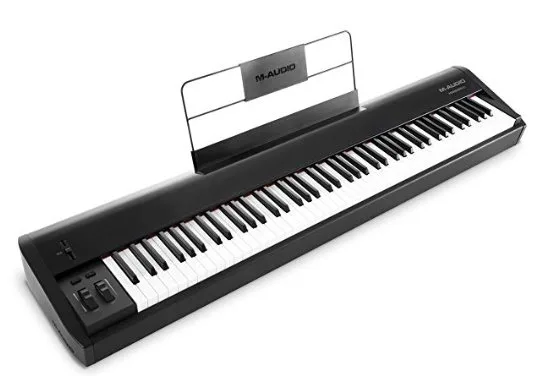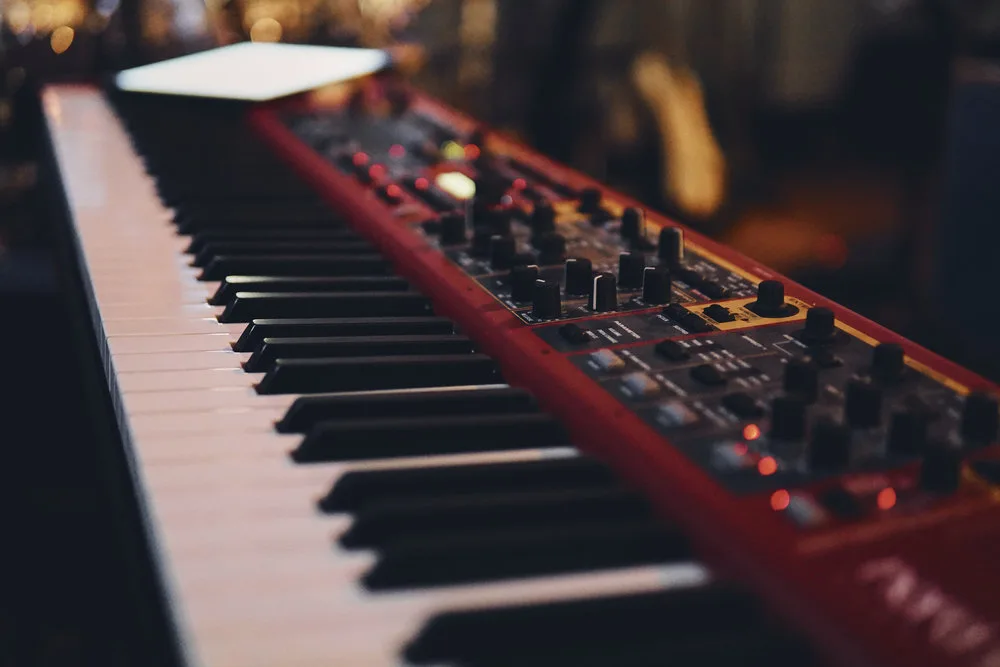Are you a beginner musician or an experienced player looking for a new keyboard? You’ve probably come across two popular options: 88 and 76 key keyboards. But which one is the right choice for you? As someone who has been playing keyboards for years, I understand the importance of choosing the right instrument that fits your needs and style of play.
In this article, we will explore everything you need to know about 88 vs 76 key keyboards. From their differences in size and range to their functionalities and prices, we’ll break it all down so you can make an informed decision. Whether you’re planning to play classical piano pieces or experiment with electronic music, I’ve got you covered! So let’s dive into this expert guide and discover which keyboard is the perfect fit for your musical journey.
So, 88 vs 76 key keyboard?
Choosing between an 88 key and a 76 key keyboard can be a tough decision, especially for beginners or those looking to upgrade their current instrument. Both options have their own unique advantages and it ultimately comes down to personal preference and intended use.
An 88 key keyboard offers the full range of keys found on a traditional piano, allowing for more complex pieces to be played accurately. This is ideal for advanced players or those who are serious about classical music. However, the larger size and weight of an 88 key keyboard may not be practical for someone with limited space or who needs to transport their instrument frequently.
On the other hand, a 76 key keyboard still provides enough range for most popular songs and compositions while also being more compact and lightweight. It’s a great option for musicians who need portability or prefer playing contemporary styles of music that don’t require as many keys.
Ultimately, both types of keyboards have their merits and it’s important to consider your individual needs before making a decision. If you’re unsure, try testing out both options at a music store or doing some research online to see which one feels more comfortable for you. Whichever you choose, remember that practice makes perfect and with dedication, any keyboard can become an extension of your musical expression.
Understanding the Difference between 88 and 76 Key Keyboards
When choosing a keyboard, the number of keys can truly impact your playing experience. An 88-key keyboard mirrors an acoustic piano’s full range, offering seven octaves plus three additional lower notes. This extensive range is perfect for classical pieces or compositions that require both high and low notes. The extra keys allow pianists to explore music more fully, granting access to every note they might need.
On the other hand, a 76-key keyboard cuts down on some of those extreme highs and lows yet retains enough variety for most modern music genres. Imagine having nearly six-and-a-half octaves at your fingertips! It also makes the instrument lighter and more portable—a boon if you’re frequently on the move or have limited space at home. While you lose some key real estate with 76 keys compared to 88, it often comes with all necessary features like multiple voices and connectivity options.
Choosing between these keyboards boils down to what kind of music you play:
- If you’re into heavy classical pieces: The 88-key version might be indispensable.
- If versatility in a compact form factor is important: Go for the 76-key model.
Ultimately, it’s about matching your instrument with your musical needs.
Your ideal choice will harmonize beautifully with how—and where—you love to play.
Explore the Pros and Cons of a 76-Key Keyboard
Imagine playing your favorite songs on a 76-key keyboard. It’s like having the best of both worlds. For one, it’s less bulky than an 88-key piano but still offers more range than a 61-key model. This makes it perfect for musicians who need portability without sacrificing too many octaves. You can easily move it from room to room, or even take it to gigs and practice sessions without feeling weighed down.
On the flip side, there are some downsides you might want to consider:
Limited Range: If you’re into classical music or pieces that demand extensive key use, you might find yourself missing those extra keys.
Compromise in Sound Quality: Some models may not have the same depth of sound as their larger counterparts.
Learning Curve: If you’re transitioning from a traditional piano, adjusting to fewer keys can be challenging at first.
So while a 76-key keyboard strikes a balance between size and functionality for many musicians, it’s important to weigh these factors before making your choice. In essence, this type of keyboard is excellent if convenience is high on your list but might fall short if you’re aiming for full-range compositions.
Read also: Is Simply piano 100% free
The Advantages/Disadvantages of an 88-Key Keyboard
If you’re diving into the world of music, having an 88-key keyboard can be quite the adventure. First off, let’s chat about its highlights. An 88-key keyboard mimics the range and feel of a traditional piano, so it’s perfect for aspiring pianists who crave authenticity. With all those keys, you get to explore seven full octaves plus a few extra notes—ideal for classical pieces that demand a broad range or modern compositions that go from very low basslines to high-pitched melodies.
Now, let’s touch upon some challenges. Despite being fantastic for musical depth and versatility, 88-key keyboards can be cumbersome. They are generally larger and heavier than their smaller counterparts. This makes them less portable and harder to fit in cozy spaces like small apartments or crowded rooms. Additionally:
- They often come with a higher price tag.
- You might not always need all those keys if you’re just starting out or focusing on genres like pop.
While it’s wonderful to have access to every key possible—and it surely lets your creativity soar—the investment might not be necessary for everyone.
In essence, it’s about balancing what you need versus what you’re ready to handle both physically and financially.

Deciding Factors: Which is More Suitable for Your Style, 88 or 76-Key Keyboards?
Choosing between an 88-key and a 76-key keyboard can feel like picking the perfect pair of shoes. Let’s dive into what makes each option unique so you can find the one that fits your musical journey. An 88-key keyboard offers the full range of a traditional piano, giving you all seven octaves plus a few extra notes. This is fantastic if you’re playing classical compositions or pieces that demand extensive note ranges. It’s also great for developing proper finger technique since you’ll have access to every key you’d find on an acoustic piano.
On the other hand, a 76-key keyboard has its own charm and practical benefits. Slightly smaller yet still substantial, it usually drops the highest and lowest octaves but keeps enough range for most modern music genres like pop or rock. If space is at a premium in your home or studio, this size could be more convenient without sacrificing too much functionality.
Here’s why you might choose one over the other:
- Portability: A 76-key model is lighter and easier to transport.
- Space: Less room required for those tight corners in small apartments.
- User Needs: Ideal for beginners who don’t need all 88 keys initially.
Ultimately, pairing your needs with these nuances will guide you toward making the best choice for your musical style!
You may also like: Fender Stratocaster Guitar
Conclusion: Making a Choice Between an 88 or a 76-key keyboard.
Choosing between an 88-key and a 76-key keyboard can feel like standing at a crossroads. For some, the full span of an 88-key might be seen as non-negotiable. Its expansive range allows pianists to tackle classical pieces requiring both deep basses and sparkling high notes. Imagine trying to play Beethoven’s “Moonlight Sonata” without those lower keys; it just wouldn’t sound the same. But it’s not just about classical music—jazz musicians also benefit from that extra space to explore intricate harmonies.
On the other hand, there’s something quite appealing about a 76-key keyboard for many modern players. Picture this: you’re gigging around town, hopping in and out of Uber rides or cramped backstage areas with your gear. A more compact keyboard becomes incredibly practical here. It’s lighter, takes up less room, but still manages to cover most musical needs comfortably—from pop songs to rock ballads and even certain jazz standards.
- Portability: The 76-key saves on weight.
- Range: The 88-keys provide complete versatility.
Ultimately, making that choice hinges on your personal lifestyle and musical requirements—whether you favor comprehensive range or value ease of transport more highly.

